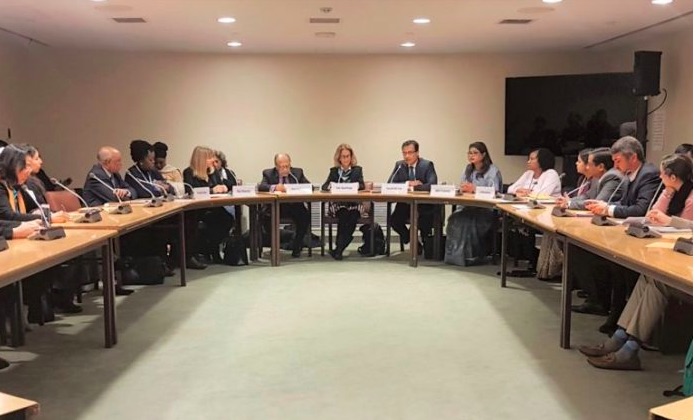FREE FLOW OF INFORMATION
Concept note from calendar of side events of the Commission on the Status of Women published by UN Women
Meeting date: March 21st, 2019 | Time: 10.00 AM to 11.15 AM
Venue: Conference Room-A, UNHQs
The United Nations came into being at the end of the devastating World War II as a forum for resolving conflicts peacefully between nations and for promoting sustainable peace and development in all parts of the world. Over the years, the UN has discussed many ways and means to reach its broader objectives of peace, human rights and sustainable development. For that, its Member States have agreed on some consensus frameworks and instruments to promote human rights and sustainable peace. One such remarkable instrument is UN General Assembly’s decision on the concept of “Culture of Peace” taken in 1999. Year 2019 will observe the 20th anniversary of that landmark decision.

Photo of event from Bangladesh News USA
Since wars begin in the minds of men, it is in the minds of men that the defenses of peace must be constructed. These famous words were codified in UNESCO’s constitution and defined the mandate that peace not only is the absence of armed conflict or war. After nine-months long intense negotiations among all UN Member States, on 13 September 1999, the General Assembly adopted, by consensus and without reservation, the seminal resolution 53/243 on the ‘Declaration and Programme of Action on a Culture of Peace’ [that had been drafted and submitted by UNESCO – editor’s note].
(continued in right column)
What is the United Nations doing for a culture of peace?
(continued from left column)
The Declaration and Programme of Action on a Culture of Peace tried to provide a pathway following which international community could develop a mindset and modes of behaviour that will not allow conflict, violence and hatred to undermine the overarching goals of sustainable peace. Developing a culture of peace requires a positive, dynamic participatory process where dialogue is encouraged among various stakeholders, to find out root causes of conflicts and through mediation and moderation as well as in a spirit of mutual understanding and cooperation, solve those conflicts to advance peace. An essential foundation of the culture of peace is inclusivity, equality and solidarity of all peoples, races, religions, class, and importantly, gender. Gender inequality, conflict and fragility are key challenges to sustainable peace. Peace is inextricably linked to equality between women and men. Women’s equality and empowerment is, therefore, critical to advancing the culture of peace.
This very idea resonates both in General Assembly and the Security Council. In 2000, the important role of women in peace and security was emphasized in the Council’s Resolution 1325 on Women Peace and Security (UNSCR 1325) which asked for full and equal involvement of women at all levels for the maintenance and promotion of peace and security. Today, despite the consensus agreement by the international community, women still face many challenges and inequalities that prevent their representation and participation in all stages of life.
Women bring a new breadth, quality and balance of vision to our common efforts to move away from the cult of war and towards the culture of peace. Increasing gender equality has positive effects on food security, extremism, health, education and numerous other key global concerns. Women’s equality makes our planet safe and secure. Empowering women and girls and strengthening gender equality prepare the foundation of inclusive societies, sustainable peace and development. Greater involvement of women in decision making be it in conflict or peace time will bring different perspectives and priorities than men thereby changing the nature of the dialogue, an essential element in advancing the culture of peace.
Objectives
– Discuss experiences and lessons learned on empowering women in all stages of socio-economic and political lives;
– Identify challenges that prevent women from engaging and participating in processes hindering their social inclusion;
– Discuss the role and contribution of women in promoting the culture of peace;